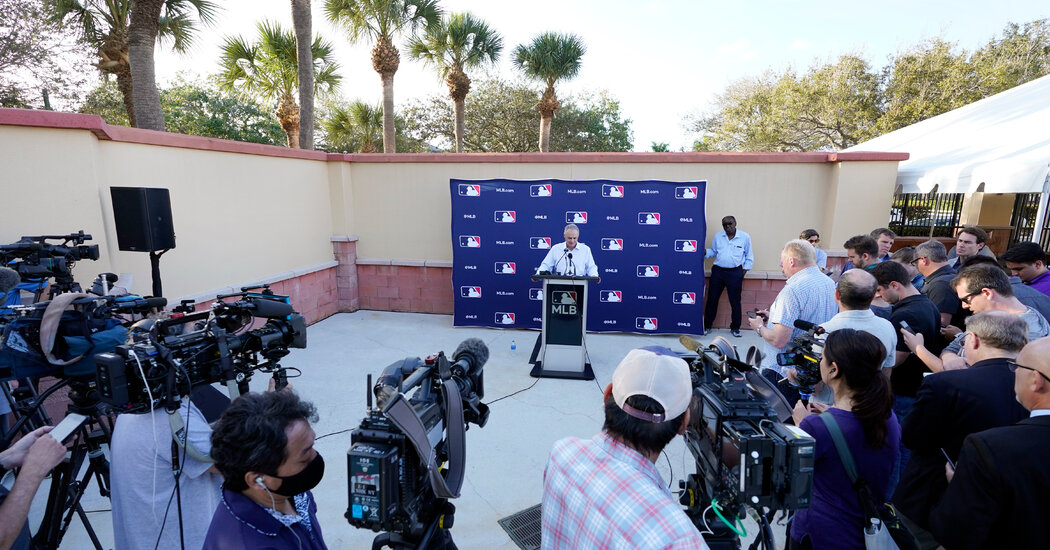Commissioner Rob Manfred boasted of his streak of successful labor negotiations, but by effectively creating a salary cap he had to know this deal would fail.
Rob Manfred hailed himself last month as a master negotiator, boasting of his flawless record in collective bargaining: four labor deals and no missed games since his hiring by Major League Baseball in 1998. If anyone had a problem with him now, Manfred strongly suggested, it was on them.
He still believes it. On Tuesday in Jupiter, Fla., Manfred, M.L.B.’s commissioner, announced that he had canceled the first two series of the regular season, a casualty of the lockout he started three months ago. Manfred insisted last month that canceling games would be a “disastrous outcome” for the sport, yet he will not own that disaster — or express any regret over failing to earn the trust of players as grievances built and tensions simmered.
“Look, what I would say is we did take a stab at some early negotiations throughout the five-year period,” Manfred said. “There was a lot of rhetoric about dissatisfaction with a deal that they made. A lot of the rhetoric was negative with respect to clubs, the commissioner’s office, me. That environment someone else created. And it’s an environment in which it’s tough to build bridges.”
If you can’t build ’em, burn ’em.
As league revenues have risen, salaries have declined. The union ceded too much ground in past deals, and sharp front offices found ways to exploit the system. For almost every team, the luxury tax threshold has served as a salary cap. And for all the goodies Manfred and the owners supplied in their final offer on Tuesday, they had to know it was dead on arrival.
The league’s insistence on bumping up the luxury tax threshold by only $10 million, to $220 million, and keeping it at that level for three years, said it all. Opposition to a salary cap is the first commandment for all true believers in the players’ orthodoxy. The offer was engineered to be rejected by the union and its executive director, the former player Tony Clark.
“Look, we have a payroll disparity problem,” Manfred explained. “And to weaken the only mechanism in the agreement that’s designed to promote some semblance of competitive balance is just something that I don’t think the club group is prepared to do right now.”
Ownership frets about competitive balance in every labor negotiation, but it’s becoming a hard sell. In the last dozen seasons, the Missouri teams have combined to win more World Series (2) than the Los Angeles Dodgers and the Yankees (1). In that time, the Yankees and the Dodgers have combined to outspend the St. Louis Cardinals and Kansas City Royals by more than $2 billion.
It is easier to win with a bigger budget, obviously. But some small-market teams deserve to be doormats because of bad decisions. Nobody forced the Pittsburgh Pirates to trade three dynamic young players to Tampa Bay for Chris Archer. Nobody forced the Baltimore Orioles to gut its budget for international talent so it could build around Chris Davis.
The union wanted the luxury-tax thresholds to start at $238 million in 2022 and rise to $263 million by 2026. With franchise values soaring and lucrative cable and streaming contracts, that hardly seems like an outrageous ask. Yet the league’s proposal peaked at $230 million in 2026. Not even close.
Manfred is charged with steering the 30 club owners, each with his own agenda, toward a common vision. Then he must forge a bond with the union, whose goal is to get more money from his bosses. If he is too cozy with the players, he loses clout with the owners.
Consider Fay Vincent, the last commissioner to preside over a March lockout, which came in 1990. Vincent understood that the union did not trust his office, with good reason — the owners had illegally colluded against the players to suppress free agency in the 1980s. Vincent needed a deputy who could effectively engage with the union’s executive director, Donald Fehr, and he hired Steve Greenberg, whom Fehr deeply respected.
“The only person on the owners’ side, and this includes me, who had credibility with Don Fehr was Steve Greenberg,” Vincent, 83, recalled by phone on Tuesday from his home in Vero Beach, Fla. “So they went into a little room on the side of my office on Park Avenue. They were gone for about an hour and they came back and said, ‘We have made a handshake on these issues. Let’s explain what they are and we hope the two sides will agree.’
“Some of the owners didn’t agree; they wanted to stay and fight, but calmer heads prevailed. And my lesson from that is eventually, these negotiations come down to one or two people on each side deciding to bury the morality issue — who’s right, who’s wrong — and look at it, just ruthlessly, financially, and say, ‘We can’t go on anymore, because if we do, we’re hurting ourselves. We’re destroying our own lunch and our own dinner, and that never makes sense.’”
The sides came together, pushed the regular season back by a week and played a full 162-game schedule in 1990. But the owners never forgave Vincent, ousting him two years later and replacing him with one of their own, Bud Selig, then the owner of the Milwaukee Brewers.
If collusion didn’t work, the owners thought, maybe they could break the union by insisting on a salary cap in 1994. The players held firm with a strike that canceled that year’s World Series, and owners used replacement players the next spring training. It took an injunction by a federal judge in the Southern District of New York — Sonia Sotomayor, the future United States Supreme Court justice — to halt that farce and restart the sport.
This is the kind of shady history the players are fighting, and for all of his self-assurance, Manfred has not convinced the players that the owners really view them as partners. That is a failure of leadership, and it has ended the commissioner’s winning streak.
Now, as the league and the union take a break after nine straight days of failed talks, Vincent says the fans should, too.
“With Ukraine what it is, it may be a good time for baseball to be in the shadows,” he said. “The rest of the country should be focusing on real things. And baseball is entertainment. It’s a game. I mean, it really is not life-shattering.”




























